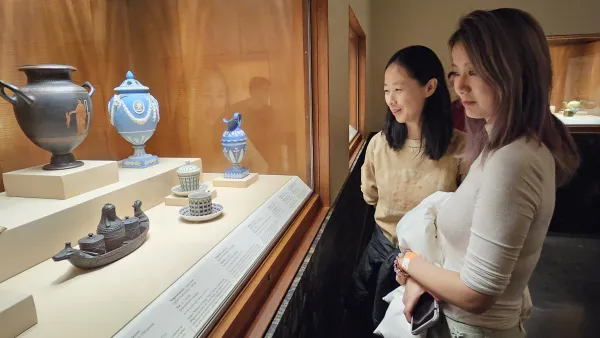Elsa Chanez, PhD in Japanese Language and Literature, shares her summer experience
This summer, thanks to the generous sponsorship of the Office of Graduate Studies & the Graduate Center, I was fortunate to be one of four WashU students invited to attend the Graduate Student Summer Residency program organized by the National Humanities Center (NHC) in North Carolina. This program, which has been taking place since 2015, focuses on a different topic each year and includes workshops, lectures, discussions, and group work related to pedagogy and technology to help graduate students in humanities programs hone their pedagogical, research, and academic skills. The residency this year, entitled “Creating an Accessible Classroom and Inclusive Curriculum,” took place from July 17th to 23rd and was attended by thirty-three graduate students from various programs all around the United States.
Each day, we engaged with different speakers who helped us navigate specific topics. On the first day, we met with Melvin “Jai” Jackson from North Carolina State University to explore ways of crafting a more inclusive syllabus. Together, we explored strategies for fostering a sense of belonging in the classroom through practical applications, such as sharing your syllabus early with your students, including a diversity, equity, and inclusion statement, and using warm and inclusive language, among many others. We workshopped our own syllabi by exchanging them with other students from and outside of our own fields of study. Some of the participants had a lot of experience teaching, and it was very interesting to listen to their own strategies and learn from them.
On the second day, we learned about ways of curating our online presence with Imani Danielle Mosley from the University of Florida. We discussed social media but also how to produce public-facing works in general. We also examined the process of writing for a publication such as NPR or the New York Times, where Professor Mosley has published articles. Public humanities work was also a topic we considered on our fourth day with Ashley Melzer, the director of the Humanities for the Public Good Initiative, who lead us through many activities that aimed to help us to conceive public-facing events that we could organize around our research and or to benefit our communities in and outside our universities. On the third day, Davide Carozza of Georgetown University lead a discussion on grant writing, through which we explored ways of finding grants that best apply to us and how to craft a successful grant application before workshopping our own drafts. Finally, on our last day, we were able to attend different workshops on the topic of alt-academia with several speakers who provided great insight on career opportunities in unexpected branches of academia and beyond. I enjoyed how open each and every speaker was, and how much information they were willing to share with us from their own personal experiences. Hearing them talk frankly about how much money they would expect to receive for certain work and how they find ways of balancing their careers and their personal time was refreshing.
Throughout the week, we also attended workshops run by the NHC’s staff. My favorite one was the session on file management, which showcased productivity tools like Zotero and best practices for classifying and sorting materials while writing articles and dissertations or performing archival research. These activities were both useful for our own edification and helpful as an introduction to the support that NHC fellows could count on during the longer programs that scholars may attend throughout the year. The staff at the NHC also organized fun activities, such as a trivia and ice cream night, which allowed us to get to know each other and network in an entertaining and relaxed manner. I would also like to note that the cooking staff at the NHC provided us with fantastic and delicious food every day!
I really enjoyed myself during this week, but I also gained valuable tools and knowledge to make myself a better scholar and teacher. It was enlightening to talk with great speakers and other graduate students from various universities, learning with them and from them. I was able to network with students from humanities programs I otherwise wouldn’t have engaged with and learn not only about their works but also how they are endeavoring to become better instructors and scholars.
The recurring news of humanities departments being defunded or dismantled is always disheartening, but I believe that programs such as the ones organized by the NHC are able to highlight the best of what humanities programs have to offer, both in and outside of academia. The Center’s website is full of helpful tools which highlight the importance of fostering the study of the humanities, such as the Humanities in Action webpage, which provides useful insights into important issues in humanities research and education.
I would like to thank the Office of Graduate Studies & the Graduate Center, and in particular, Jessica Cissell, the Director of Graduate Programming, for their kind sponsorship, as well as everyone at the NHC, especially Meredith Graham for all she organized and her great support and kindness. I would also like to thank all the participants who made this residency such a productive and fun week. I appreciate how much everyone shared throughout the week.
The NHC Graduate Student Summer Residency is an exceptional opportunity for students at WashU, and I would encourage interested students to apply for this program, as well as others they provide, such as their Podcasting the Humanities virtual institute.


